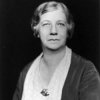Mary Ritter Beard

Mary Ritter Beard
Mary Ritter Beardwas an American historian and archivist, who played an important role in the women's suffrage movement and was a lifelong advocate of social justice through educational and activist roles in both the labor and woman's rights movements. She wrote several books on women's role in history including On Understanding Women,America Through Women's Eyesand Woman As Force In History: A Study in Traditions and Realities. In addition, she collaborated with her husband, eminent historian Charles Austin Beard on several...
NationalityAmerican
ProfessionHistorian
Date of Birth5 August 1876
CountryUnited States of America
Mary Ritter Beard quotes about
Woman's success in lifting men out of their way of life nearly resembling that of the beasts who merely hunted and fished for food, who found shelter where they could in jungles, in trees, and caves was a civilizing triumph.
For hundreds of years the use of the word 'man' has troubled critical scholars, careful translators, and lawyers. Difficulties occur whenever and wherever it is important for truth-seeking purposes to know what is being talked about and the context gives no intimation whether 'man' means just a human being irrespective of sex or means a masculine being and none other.
The woman's bill of rights is, unhappily, long overdue. It should have run along with the rights of man in the eighteenth century. Its drag as to time of official proclamation is a drag as to social vision. And even if equal rights were now written into the law of our land, it would be so inadequate today as a means to food, clothing and shelter for woman at large that what they would still be enjoying would be equality in disaster rather than in realistic privilege.
The dogma of woman's complete historical subjection to men must be rated as one of the most fantastic myths ever created by the human mind.
The volumes which record the history of the human race are filled with the deeds and the words of great men ... [but] The Twentieth Century Woman ... questions the completeness of the story.
It's only very recently that women have succeeded in entering those professions which, as Muses, they typified for the Greeks.
One must learn, if one is to see the beauty in Japan, to like an extraordinarily restrained and delicate loveliness.
Wherever we go, across the Pacific or Atlantic, we meet, not similarity so much as 'the bizarre'. Things astonish us, when we travel, that surprise nobody else.
Viewed narrowly, all life is universal hunger and an expression of energy associated with it.
While it is generally agreed that the visible expressions and agencies are necessary instruments, civilization seems to depend far more fundamentally upon the moral and intellectual qualities of human beings-upon the spirit that animates mankind.
The trade agreement has become a rather distinct feature of the American labor movement. ... It is based on the idea that labor shall accept the capitalist system of production and make terms of peace with it.
Despite the modern dogma to the effect that women were a subject sex until the nineteenth century 'emancipated' them from history, women in history had demonstrated strong wills and purposes, had made assertions, and had directed or influenced all human destiny, including their own, since human life began.
Democracy cannot sustain itself amid a high degree of violence.
Unless one's philosophy is all-inclusive, nothing can be understood.